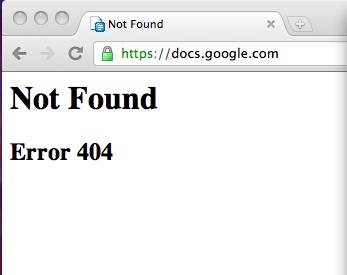It’s the new Blue Screen of Death:

First rule of Don’t Be Evil should be “First, do no harm…”
It’s the new Blue Screen of Death:

First rule of Don’t Be Evil should be “First, do no harm…”
There’s an interesting story in the New York Times about how Nordstrom is driving strong same store sales with a supply chain and inventory system that allows online customers from Nordstrom.com to see what’s in each store online. The customer can then drive to the store and see the product live, or can have the product shipped to them from the store.
What? You can’t do that with every major, high-end retailer?
The vast majority of multichannel retailers (as they’re called, although any retailer that’s surviving or succeeding must be a multichannel retailer) run each channel separately. “Traditional retailers have a traditional way of doing things” as Adrianne Shapira, an analyst at Goldman Sachs, points out in the article.
A large share of the innovation you’ll see in Retail and E-commerce will be in more efficient supply chain and inventory management. These improvements that seem to be behind the scenes will drive the blurring of online and physical, and play a key role in change and innovation in the coming decade.
Recently, personal finance startup Mint was acquired by Intuit for $170 million in cash.
There’s many lessons and stuff to discuss, which I’m sure will be done and done again. CEO Aaron Patzer has already enumerated some of them with a post on TechCrunch.
Certain other tactical choices are now validated as correct for Mint, but possibly incorrect for others.
I like the stuff about operating on a shoestring and generally being resourceful. The main lesson I like is focusing on a product that people want and need. One step further, successful software time and time again has launched fast and iterated quickly. I can’t reiterate enough how much these are commonalities in success stories.
But to further the inevitability of their success: Mint was “mint” to start with, but definitely got even better as time went on – an iPhone alert tuned me in that I should write a blog post reiterating this. Ever since Mint was on TechCrunch40, I followed the company. As the product got better, it’s basically an automated and very pretty Quicken for me. Perfection!
“It is not the critic that counts. The credit belongs to the man who is actually in the arena; whose face is marked by dust and sweat and blood; who strives valiantly; who errs and comes short again and again; who knows the great enthusiasm and great devotions, and spends himself in a worthy cause, who at the best, knows in the end the triumph of high achievement; and who at the worst, if he fails, at least fails while daring greatly; so that his place shall never be with those cold and timid souls who know neither victory nor defeat.”
-Teddy Roosevelt
For those striving for excellence, sometimes it’s difficult to remember that just being in the arena counts for a lot.
Seth Godin had another brief, biting post about sunk costs, as the number one thing they teach you in business school that is ignored. I always enjoy his terse posts to bring about maximum effect.
However, I found myself taking issues with this post. The principle is sound: it doesn’t matter what you spent in the past, only your expectations for the future.
I think I took issue because psychologically effects from sunk costs affects most people, including myself. But I couldn’t help but think first of all that sunk costs are spent in the first place because of an expectation of future return, rational or irrational. Abandoning ship, as it were, or ignoring sunk costs ignores this expectation.
The principle does still stand, for this expectation would be part of your “future” calculation. Given Mr. Godin’s succinct nature, I feel this was somewhat lost. So, I felt it enough to take some time off an extremely busy time to sound off with a quick blog post. After all, this is also coming from the famous author who recently wrote The Dip, saying that those who are successful are those who can push those the dip (and quit the dips that are too deep and too long).
Later, I found myself thinking about poker metaphors.
The metaphor of poker applied towards business is not straightforward. I only mention these metaphors because “ignoring sunk costs” is just as convoluted. Ignore sunk costs at your own peril, but make your calculations wisely.
One more poker metaphor, slightly unrelated: always sit down at the table with the drunk guy. I’m not a fan of casino poker at times when the goal is to win the maximum possible, because it’s hard to beat the table rake (amount casino takes) with a table of comparably competent players. With a drunk guy, I am, preferably two. In other words, you win the game when you have a systemic advantage and it’s wise to heed this advice in business as well.
Gotta love those poker metaphors.
Recent Comments